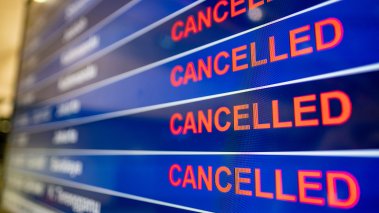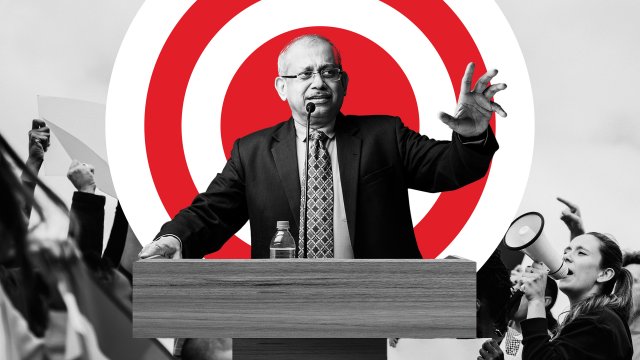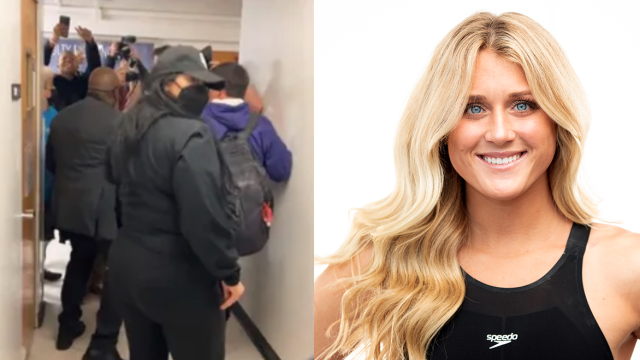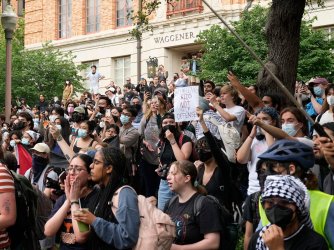Table of Contents
Deplatforming attempts are surging in 2024

Shutterstock.com
FIRE just updated its Campus Deplatforming Database, and in just the first three months of the year, we recorded 67 deplatforming attempts, including 39 new entries since the end of February.
What does this mean? We are on pace for over 250 deplatforming attempts this year, a number that would shatter last year’s record of 157 deplatforming attempts.
Why are deplatforming attempts surging in 2024? The October 7 attacks by Hamas and Israel’s military response ignited a firestorm of protests on college campuses, in concert venues, and elsewhere across the country. Of the 67 deplatforming attempts already recorded in 2024, 49 of them (or 73%) involve a controversy over the Israeli-Palestinian conflict.

Campus Deplatforming Database
Databases
This research documents the ways and reasons that deplatforming attempts occur on college and university campuses from 1998 to the present.
Event disruptions are also on the rise. Thirty of the deplatforming attempts recorded in 2024 — or almost half of them — were either an attempted disruption (19) or a substantial event disruption (11). Twenty-seven of these disruptions involved controversies regarding the Israeli-Palestinian conflict.
To put this in perspective, FIRE recorded 53 event disruptions in 2023 — 22 attempted and 31 substantial event disruptions. Just 13 of them involved a controversy over the Israeli-Palestinian conflict, and most of those occurred after October 7.
So, the number of event disruptions over the Israeli-Palestinian conflict in 2024 has already doubled compared to last year, and there are still nine months left in 2024!
What kinds of campus events are experiencing disruptions? The events experiencing disruptions involve Israeli or Jewish speakers, those that feature speakers who support Israel in its conflict with Hamas, or those that feature high-level administrators like university presidents.
The event disruptions we have recorded since the end of February include:
- Shout downs of university presidents at an annual honors convocation at the University of Michigan and at a presidential town hall with students at Rutgers, and an attempt to disrupt an event featuring Condoleezza Rice, the former Secretary of State and current director of the Hoover Institution at Stanford University, and Carol Christ, the chancellor of the University of California Berkeley.
- Shout downs of Daniel Kurtzer, the former U.S. ambassador to Israel, at the University of Washington; Asaf Peer, a physics professor at Bar-Ilan University in Israel, at the University of Nevada, Las Vegas; and of Ran Bar-Yoshafat, an Israeli Defense Force soldier at UC Berkeley.
- Attempts to disrupt events featuring former congressman and Hamas critic Allen West at Saint Louis University; IDF reservist Rudy Rochman at Georgetown Law; Gal Cohen-Solal, an Israeli survivor of the October 7 attacks, at the University of Kansas; and Jesse Ehrenfeld, the new president of the American Medical Association, at the University of Chicago.
Some of the speakers are IDF soldiers or reservists (Bar-Yoshafat, Rochman), and another is a survivor of the October 7 attacks on Israel (Cohen-Solal). All of them intended to discuss the Israeli-Palestinian conflict in general as well as the current conflict between Israel and Hamas in Gaza.
But other speakers were on campus to discuss topics like black holes (Peer) or LGBTQ+ equity in medicine (Ehrenfeld), or to praise students for their academic performance at an honors convocation (Santa Ono, the University of Michigan’s president).

OUTRAGEOUS: SFSU students shout down Riley Gaines and accost her after event
News
Former NCAA swimmer Riley Gaines was invited to campus by Turning Point USA to talk about gender and sports but was met by an angry crowd chanting and screaming at her to leave.
Disinvitation season? FIRE refers to the end of the spring semester on campus as “disinvitation season” — when students, faculty, and others (e.g., alumni, trustees) demand that their college or university disinvite a commencement speaker because they disagree with something that speaker did, said, or believes.
For instance, former competitive swimmer and social activist Riley Gaines was recently announced as the commencement speaker at Adrian College and she is already the target of an online petition to disinvite her from the commencement ceremony because of “her controversial stands that are far from inclusive” and because “[h]er presence at such an important event could potentially harm those who support or belong to our community.”
Even if someone thinks Gaines is a polarizing choice for a commencement speaker, as the events documented above indicate, there is no reason to think that less controversial speakers will not also generate controversy or experience attempts to disrupt their remarks.
Disinvitation season is upon us, brace yourself.
Want to know more? Dive into the Campus Deplatforming Database here.
Recent Articles
FIRE’s award-winning Newsdesk covers the free speech news you need to stay informed.

Freedom or safety? College admins don’t need to choose.

Texas tramples First Amendment rights with police crackdown of pro-Palestinian protests

Kansas takes a stand for intellectual freedom


